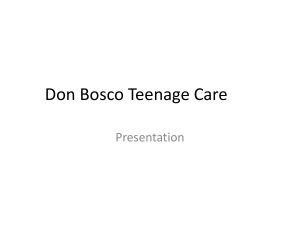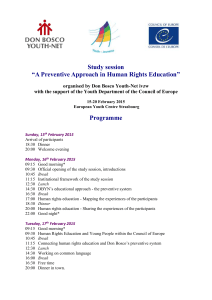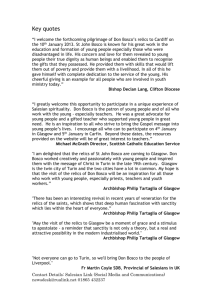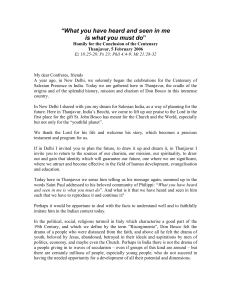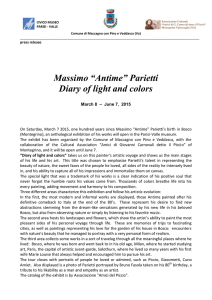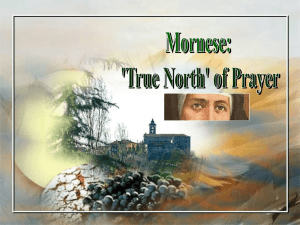BoSCO - Xavier Prat
advertisement
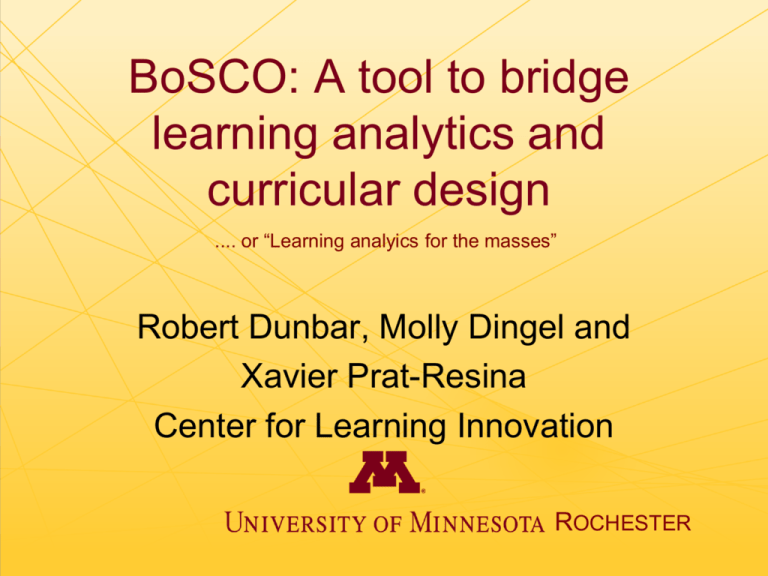
BoSCO: A tool to bridge learning analytics and curricular design .... or “Learning analyics for the masses” Robert Dunbar, Molly Dingel and Xavier Prat-Resina Center for Learning Innovation ROCHESTER Center for learning innovation @ UMRhttp://r.umn.edu/academics-research/cli Longitudinal study of student learning Year 1 Year 2 Year 3 Bachelor of Science in Health Sciences Year 4 Instructors work in different disciplines integrating content and learning strategies • Work group and collaboration • Technology focus • Discipline integration oriented towards Health Science • Civic engagement and capstone experience • Wide use of active learning approaches • Continuous and longitudinal assessment of learning A regular day in a teacher’s life Teachers! You just graded a midterm exam You think the grade is lower than last year’s Is it true? ...Last year’s were better students? ...I should have seen this coming? How can data improve learning? The ADDIE model What does the tool need? Available to instructors during the course An “easy to use and visual” tool rather than a sophisticated statistical analysis package Include grades but also • demographics • behavioral surveys • metagrades Select and combine student data to be displayed in many ways Where is all my data? • Does your institution always use the same course management system? Same server? • Do you have access to all data from all students that you ever taught? • Do you keep track of student consent through the years? • Do you have a systematic way to deidentify student data? Data storage, access and display Data warehouse PeopleSoft Moodle gradebooks Grade info: -granularity -metadata Learning Objects Outcomes iSEAL DB BoSCO • Selection • Representation • Analysis Faculty surveys not on Moodle intelligent System for Education, Assessment, and Learning IRB Deidentify Students Others: Alumni survey Stud. develop. Set grade permissions Browser of Student and Course Objects BoSCO: A Browser of Student and Course Objects – BoSCO: a hypothesis generator, an intentional browser, no spurious correlations, a radiography or the fingerprint of a curriculum – Developed by and for faculty (still in beta) – It runs on the browser – Open source: available for downloadhttps://sites.google.com/a/r.umn.edu/pratresina/research/bosco Robert L. Dunbar, Molly J. Dingel, Xavier Prat-Resina Connecting Analytics and Curriculum Design: Process and Outcomes of Building a Tool to Browse Data Relevant to Course Designers J. of Learning Analytics. 3(1), 220-240, 2014 The quest to measure learning BoSCO will allow you to browse, select, filter student data and download it for further analysis “We believe that the p < .05 bar is too easy to pass and sometimes serves as an excuse for lower quality research,” BoSCO: type of selections Regular set Multisemester set Multicourse set BoSCO: type of representations • Histograms (bar graph), Scatter plot, Timeline, Correlation matrix Examples 1. Understanding student preparedness in chemistry 2. Is Homework useful? Finding SLO/SDO in metagrades 3. Assess flipping the class: Avoid a control group 4. ACT engage: Behavioral surveys and student performance Example 1: Understanding student preparedness in chemistry • 2010-2014. Five years of General Chemistry • Histograms: females vs males • Scatter plots: understanding preparation. – ACT-math – GPA – Misconception chemistry and math survey • Correlation matrix Decisions: Dropped students, repeating students, completely disengaged students Example 2: Is Homework useful? • Is there any correlation between homework performance and other assigments. Should there be any? How about meta-grades? X Y Homework grade Final grade # of attempts Exams grade Grade at first attempt Type B questions Time taken Type C questions The fact that X and Y are not correlated does not mean that X is useless, rather they may address a different skill 2. Is Homework useful? Finding SLO/SDO in metagrades • Beyond a final grade: Bundle grades and metagrades that describe different outcomes or skills • • • • • Quantitative skills: % (Type B test questions) Follow through commitments: % (Homework and quizzes) Preparedness % (Grade at first attempt on quizzes) Commitment to one task and time efficient % (Time spent in quizzes) Transfer and critical thinking % (Type C and ambiguous questions) SDO and SLO may be found in “bundled grades” or metagrades rather than regular grades Example 3. Flipping the classroom. Did it help? • For non discussion-based courses, the course content is available to students at all time. • For team teaching it sets a standard and gives more freedom to the class instructor. • But is it helpful for students? Xavier Prat-Resina et al. “Exploring tools to measure the effectiveness of a flipped classroom in introductory Chemistry courses“ In preparation 3. Measuring curriculum innovations GenChem 1 – Fall2013 +curriculum innovation GenChem 1 – Fall2014 different students different years Did it make a difference? 3. Measuring curriculum innovations Ask students 3. Measuring curriculum innovations Follow students trail: Youtube Analytics and Moodle Logs 3. Measuring curriculum innovations Follow students trail: Youtube Analytics and Moodle Logs Student views vs student performance. (BoSCO) 3. Avoiding control groups Measuring curriculum innovations by comparing student performance with previous course performances. The dendrogram of the curriculum. Calc GenChem1 A&P1 Courtesy of Dr. R.L. Dunbar and the rest of CLI faculty 3. Matched pair analysis Biology – Fall2013 Dgrade = 0 Biology – Fall2014 paired (johnny-bio-f13, mary-bio-f14) +curriculum innovation GenChem 1 – Fall2013 Dgrade = + o - (johnny-chem-f13, GenChem 1 – Fall2014 mary-chem-f14) mean(Dgrade) and student t-test Acknowledgments: Dr. L. Dame and Dr. A. Petzold Example 4. Behavioral surveys and student performance Most of our students in our degree have taken ACT Engage Survey Academic Success Index Probability Retention Index Probability Academic Discipline Scale Score Academic Self-Confidence Scale Score Commitment to College Scale Score Communication Skills Scale Score General Determination Scale Score Goal Striving Scale Score Social Activity Scale Score Social Connection Scale Score Steadiness Scale Score Study Skills Scale Score BoSCO: future developments • Multiple selection of courses and semesters. Multicourse/Multisemester set Time graph: See how the current seniors did through the years. Bar graph: Compare performance in biology courses with chemistry courses BoSCO: future developments SLICE Showing Longitudinal Interactions of Course Events Quiz 1 Test 1 Quiz 2 Test 2 Final Question 1 Question A Question a Question 5 Question z Question 2 Question B Question b Question 6 Question y Question 3 Question C Question c Question 7 Question x Test grade Quiz grade Quiz grade BoSCO: Top down Curriculum Course: Org. GenChem, Biochem.. Semester: Fall11, Spring12, Fall12 Assignment 1, Paper 1, final grade Topic, Skill, Outcome, Competency SLICE: Bottom up Course: Org. GenChem, Biochem Semester: Fall11, Spring12, Fall12 Assignment 1, Paper 1, final grade Conclusions • BoSCO, an hypothesis generator. • Some SDO and SLO may be found in metagrades • Using matched-pair analysis to measure curriculum innovations. • Behavioral surveys can contribute to curriculum design Thank you
